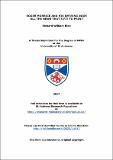Files in this item
Roger Morrice and his 'Entring book' : 'all the news that's fit to print'
Item metadata
| dc.contributor.advisor | Houston, R. A. (Robert Allan) | |
| dc.contributor.author | Bide, Richard William | |
| dc.coverage.spatial | v, 145 p. | en_US |
| dc.date.accessioned | 2017-10-25T11:12:36Z | |
| dc.date.available | 2017-10-25T11:12:36Z | |
| dc.date.issued | 2017 | |
| dc.identifier.uri | https://hdl.handle.net/10023/11917 | |
| dc.description.abstract | It is a reasonable assumption to make that anyone with a passing knowledge of British history will have heard of Samuel Pepys, the seventeenth-century ‘man about town’. His diary has been the subject of extensive research by scholars over three centuries and represents a spectacular primary source which is testament to a life lived to the full, in one of the most turbulent periods in British history. However, there is now competition for the title of most influential news- gatherer of the seventeenth century, in the form of Roger Morrice, a Presbyterian minister who acted as what today might be described as a political or investigative journalist for the period 1677-1691. His reporting activities serviced the informational needs of a network of Presbyterian patrons through manuscript newsletters which eventually he termed his Entring Book. The edited version of the Entring Book was published in 2007 under the auspices of Mark Goldie. Described by Goldie as a political work, there is no doubt that the emphasis of the Entring Book is distinctly politico-religious in nature and successfully captures the forces at work during the second half of the seventeenth century, ranging from the Restoration, the Popish Plot and the Exclusion Crisis to the Glorious Revolution. Notwithstanding this strong political bias and in spite of allusions to what today’s historians might describe as ‘social history’ in the edited Entring Book, much of the Book’s content can properly be termed as ‘social’ in nature, embracing significant subject-matter as wide-ranging as duelling, mortality, playhouses and the sexual mores of the period, alongside subjects such as diverse as child kidnap, urban violence, fire, weather and cases of suicide, to name but a few. With the political angles of the Entring Book well covered by Goldie et al, the purpose of this dissertation is two-fold. Firstly, to review the culture in which Morrice practised information-gathering for his patrons and, secondly, to shed more light on the so far neglected social dimensions of the Entring Book. | en_US |
| dc.language.iso | en | en_US |
| dc.publisher | University of St Andrews | |
| dc.subject | Roger Morrice | en_US |
| dc.subject | Investigative journalist | en_US |
| dc.subject | Seventeenth century British history | en_US |
| dc.subject | Entring Book | en_US |
| dc.subject | Social history | en_US |
| dc.subject.lcc | DA375.M78B5 | |
| dc.subject.lcsh | Morrice, Roger, 1628-1702 | |
| dc.subject.lcsh | Morrice, Roger, 1628-1702. Entring book of Roger Morrice 1677-1691 | en |
| dc.subject.lcsh | Morrice, Roger, 1628-1702--Diaries | en |
| dc.subject.lcsh | Great Britain--Politics and government--1660-1714 | en |
| dc.subject.lcsh | Great Britain--Social conditions--17th century | en |
| dc.subject.lcsh | Clergy--England--Diaries | en |
| dc.title | Roger Morrice and his 'Entring book' : 'all the news that's fit to print' | en_US |
| dc.type | Thesis | en_US |
| dc.type.qualificationlevel | Doctoral | en_US |
| dc.type.qualificationname | MPhil Master of Philosophy | en_US |
| dc.publisher.institution | The University of St Andrews | en_US |
This item appears in the following Collection(s)
Items in the St Andrews Research Repository are protected by copyright, with all rights reserved, unless otherwise indicated.

